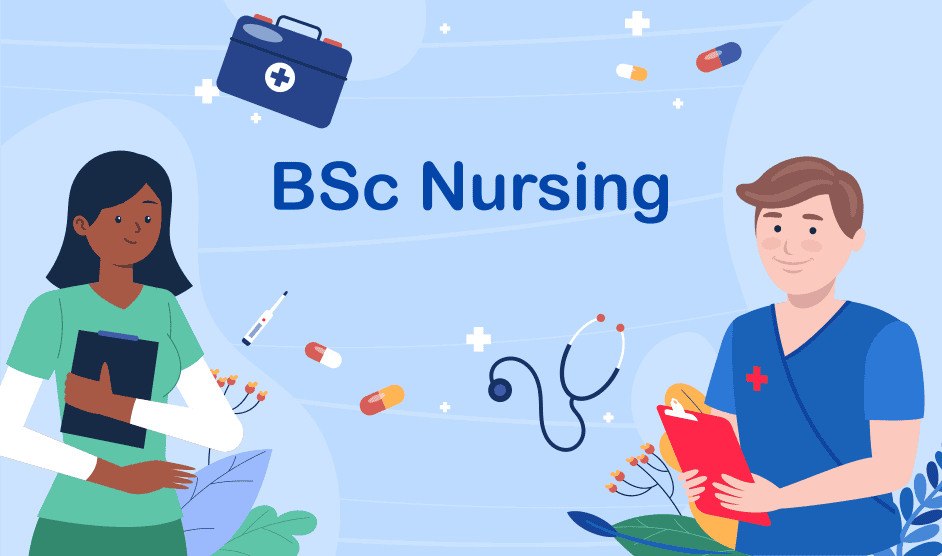B.Sc Nursing is an all-inclusive four-year undergraduate course to train professional nurses. It integrates academic content in human anatomy, physiology, pharmacology, patient care, and clinical practice. These two objectives allow graduates to offer quality care in hospitals, clinics, and community settings. Throughout the course, a student’s technical skills are augmented with critical thinking, communication, and compassion, all vital characteristics of a good healthcare provider.
In the past few years, BSc Nursing has witnessed a large enrollment because of the global requirements for skilled nurses. As per the AISHE 2021-22 report, the total number of students enrolled in BSc Nursing is 399910, which shows that it is one of the most popular courses among students, and there is an increased demand for qualified nurses in India and across the world.
Nursing courses is for individuals who aim to impact other lives positively and are committed to a challenging yet rewarding career. Let’s explore in detail what a BSc Nursing course is and why it stands out as an excellent career choice!
What is BSc Nursing?
B.Sc. Nursing is derived from a Bachelor of Science in Nursing. This type of program takes four years with the intention of producing healthcare professionals with knowledge dealing with patient care, medical procedures as well as healthcare management. Like other aspects of the course, practical experience is a focus of the B.Sc. Nursing makes clinical practice an important feature of the degree program, which prepares students for internships in hospitals and other medical facilities.
The course is popular among students as it provides them with good employment chances as well as the possibility to develop as a valuable member of a healthcare team. One of the noble careers with huge demand in India and International B.Sc. Nursing is a secure, prestigious, and lucrative line of work.
Eligibility of BSc nursing course
The BSc nursing eligibility criteria give the conditions or qualifications for admission to the course. Such criteria are:
According to INC
- Job seekers should possess their 10+2 with PCB and English as compulsory subjects, along with Physics and Chemistry.
- A candidate should not have less than a 45% mark score in PCB. Note: Hence, for SC/ST/OBC categories, much relaxation of up to 5% may be considered.
- One of the requirements presented was that the candidates should be medically fit.
As per the entrance exam NEET-UG
- Candidates must have passed or should be appearing in the final examination for 10+2 or equivalent qualification with PCB & English.
- A minimum of 50% marks in PCB for General category candidates as well as 45% for PwD and 40% for SC/ST/OBC-NCL candidates.
- Minimum age: Three years of age as of December 31 of the admission year and 17 years in case of the age not yet completed at that date.
According to the provision of the AIIMS B.Sc. Nursing (Hons.)
- Prospective candidates must have passed 10+2 examinations in English, Physics, Chemistry and Biology.
- Minimum aggregate marks:
- 50% for SC/ST categories.
- 55% for General/OBC-NCL/EWS.
- Minimum age: As of December 31 of the admission year it should be displaying 17 years.
Admission process
The admission to B.Sc. Nursing is generally done either through an entrance examination or merit depending upon the norms of the individual institution and also of the state that it comes under. Here’s an overview of the process:
Merit-Based Admission:
- Apart from the qualification which is 12th PCM, there are other requirements necessary for one to undertake the service such as being medically fit, residence, etc.
- Complete the application form, attach necessary papers and correspondingly, submit the application fee.
- If selected for the next step which is the verification of documents. To start the classes you have to pay fees and some other formalities required.
Entrance-Based Admission:
- Clear the national level, state level or university entrance exam.
- Appear for National and state-level counselling opt your choice of college, but will depend on the marks secured. If shortlisted, engage in counselling, group discussions or interviewing whenever the need arises.
- Once you meet the fees, pay the balance and clear all admission requirements so that you may commence your classes.
Bsc Nursing course entrance exams
There are many BSc Nursing entrance exams available at the national level, state level and university level. Most of the top institutes offer BSc Nursing courses only if they qualify for the exam. Therefore, candidates must sit and attain a prescribed pass level in the entrance examination. We recommend you visit and check the list of BSc Nursing entrance exams list which we have already posted.
| Exam Name | Region |
| NEET | National |
| AIIMS BSc Nursing | National |
| PGIMER Nursing exam | National |
| TS EAMCET | Telangana |
| AP EAPCET | Andhra Pradesh |
| Maharashtra BSc CET | Maharashtra |
| Bihar BCECE | Bihar |
| BSc Nursing entrance exam by J.C.E.C.E.Board | Jharkhand |
| Assam SSUHS CEE | Assam |
| CPEB BSc Nursing | Chattisgarh |
| CET by PT BD Sharma University of Health Sciences, Rohtak | Haryana |
| Entrance exam by Atal Medical & Research University, HP | Himachal Pradesh |
| NEET UG | Goa |
| J&K BOPEE | Jammu & Kashmir |
| KCET | Karnataka |
| Manipur BSc Entrance exam | Manipur |
| NEIGRIHMS B.Sc. Nursing | Meghalaya |
| PPMET by Baba Farid University of Health Sciences (BFUHS) | Punjab |
| HBNUMU Bsc Nursing Entrance exam | Uttarakhand |
| RUHS Bsc entrance exam | Rajasthan |
| a)CNET conducted by Atal Bihari Vajpayee Medical University (ABVMUb)CPNETc)SHUATS Online Entrance Test (SOET) | Uttar Pradesh |
| JENPAS UG | West Bengal |
What can I do after BSc Nursing
After qualifying for a B.Sc in Nursing there are many numbers of jobs and fields to work in. The course provides an opportunity for a large number of professions in the field of health care services and provides a stable and well-paid job. Here’s a look at potential career options after BSc nursing, government job opportunities, and further education options:
Jobs After B.Sc. Nursing
Registered Nurse (RN): Employment in hospitals, clinics, or any health care facility diagnosing, treating patients, nursing the patients, giving medicine, or helping the doctors in performing surgery.
Nursing Supervisor: Supervise a number of nurses, handle the organizations, and deliver quality sensitive services in health facilities.
Nurse Educator: Engineer the nurses of the future through schools, colleges, and other institutions of nursing.
Nurse Administrator: Manage hospitals or other healthcare facilities in order to maintain the day-to-day functioning of the institution and staff.
Health Insurance Advisor: Deal with insurance companies to follow up with patients on their health insurance claims and other policies.
Government Jobs
Many government jobs are available after B.Sc. Nursing within the state and central government of India. A widely recognized option is
Nursing Officer (NORCET): The AIIMS conducts the NORCET(Nursing Officer Recruitment Common Eligibility Test) to recruit staff nurses for its own AIIMS system of hospitals throughout the country and other top government-participating hospitals, such as NITRD, AIIPMR, CNCI etc. NORCET is among the most competitive exams for B.Sc. Nursing graduates seeking to secure government employment in the most cherished healthcare organizations.
MNS Exam: NTA conducts the MNS (Military Nursing Service) Exam to recruit staff nurses in the Indian defence. Its Short Service Commission is where students are recruited who have graduated from recognized Nursing colleges. It’s different from students joining MNS through six AFMS colleges.
Here, civil trained BSc/PB BSc/MSc (Nursing) passed-out students will be granted the staff nurse post.
Courses After B.Sc. Nursing:
M.Sc. Nursing (Master of Science in Nursing): This is a program that takes 2 years after the postgraduate level, where one can be able to sub-specialize in areas like paediatrics, mental health, or Obstetrics and Gynecology. M.Sc Nursing alumni are free for higher paying positions as well as teaching, research, or higher clinical roles.
Ph.D. in Nursing: Specifically, if someone wants to specialize in research, academia, or an independent practice, they should take a Ph.D. in Nursing. PhD courses usually involve extensive study of different health and nursing issues. PhD his is suitable for individuals aspiring to be nurse instructors/researchers to advance the practice of nursing as a science.
Diploma Courses in Specializations: You can also follow 1-year post-basic diploma course after B.Sc. Nursing to continue your career in a specific field. Below is the list:
- Critical Care Nursing
- Oncology Nursing
- Specialty of Emergency and Trauma Care Nursing
- Operation Room Nursing
- Cardio Thoracic Nursing
- Neurology Nursing.
- Psychiatric Nursing
- Emergency and Disaster Nursing
- Ortho and Rehabilitation Nursing
- Geriatric Nursing
- Neonatal Nursing
- HaematologyNursing
- Burn & Reconstructive Surgery
Salaries of a BSc Nursing graduate
The information is relative to factors such as the sector of practice, whether government or private, area of practice, experience, plus the health care facility or organization. Here’s a general breakdown of BSc nursing salary expectations for both government and private sectors:
Government Jobs
Organizations such as government hospitals, departments of Health and Family Welfare, All India Institute of Medical Sciences, and many other state organizations offering B.Sc. Nursing courses offer a good job package and a fair salary scale besides offering amenities such as a pension, medical allowances, and job security.
Nursing Officer (NORCET): For those who get a job in government institutions such as AIIMS or another central state hospital then, the pay scale of a Nursing Officer is INR 90000 per month after deduction, you can get in hand around INR 78000 (this varies with location)
Other Government Hospitals: The pay scale for a B.Sc. Nursing graduates in state-run clinical and Health departments start from INR 25,000. It may vary based on contractual or permanent positions.
Defence and Armed Forces Nursing: The starting pay scale for the nurses working in the Indian Army, Navy, or Air Force will be approx INR 85000 per month (it may vary as per the allowances).
Private Jobs:
The other prevalent method of compensation in the private healthcare sector is remuneration, whereby the wages may differ depending on the company, the hospital’s location, and the worker’s seniority. There may be better deals in packages provided by private hospitals and nursing homes for experienced nurses.
Private Hospitals: First remunerations offered to B.Sc. Nursing graduates in private hospitals are between INR 25,000 and INR 40,000 per month. Salaries are promoted based on experience and the qualifications acquired and range between INR 50,000 to INR 70,000 or above per month.
Nursing Homes & Clinics: Nurses working in small Nursing homes or Clinics may earn between INR 20,000 to INR 35,000 per month according to the size and place of the Nursing home or Clinic.
International Opportunities: After completing their B.Sc. nursing course, many students choose to work in foreign countries, including the UAE, Saudi Arabia, Canada, the UK, and the USA. Salary varies by country. We will take the example of dubai. Here, you can get a minimum of 180000 INR per month and other perks consisting of accommodation, medical, and other facilities.
Top colleges and their fees
BSc Nursing course fee structure in private colleges is high compared to government colleges. There are good government and private colleges available in India; we have listed top B.Sc Nursing colleges and their fee structure, and it will give you a fair idea of the cost of studying BSc Nursing course in India.
| Colleges | Fees (4 years) |
| AIIMS | 2500 |
| PGIMER | 6000 |
| CMC | 120000 |
| National Institute of Mental Health & Neuro Sciences | 58000 |
| JIPMER | 23040 |
| BHU | 9000 |
| AFMC | 80000 |
| Sanjay Gandhi Postgraduate Institute of Medical Sciences | 23000 |
| King George`s Medical University | 43000 |
| Datta Meghe College of Nursing | 450000 |
Conclusion
Therefore, the Bachelor of Science in Nursing (B.Sc. Nursing) is a worthwhile and crucial program for anyone aspiring to improve the lives of others in the health sector. In four years, students are given a broad range of knowledge on medical sciences, approaches to patient treatment, and management of healthcare organizations, which combines both academic knowledge and practical clinical experience. The course ensures that graduates are equipped sufficiently for various employment positions across many health facilities, including hospitals, clinics, nursing homes, among others, and health services.
Due to the growing need for professional nurses in India and overseas, BSc Nursing comes with employability and market guarantee.
For Nursing aspirants we create other blogs which will be really helpful.




